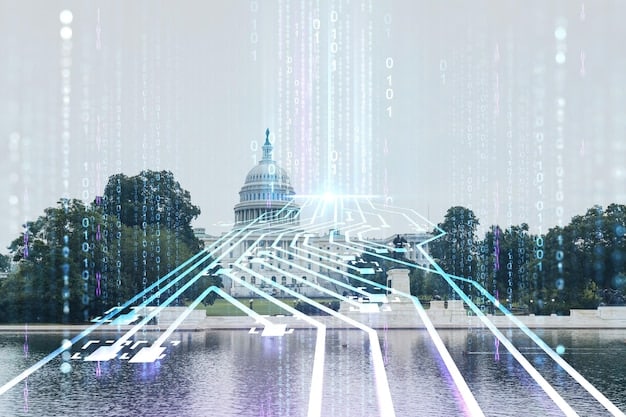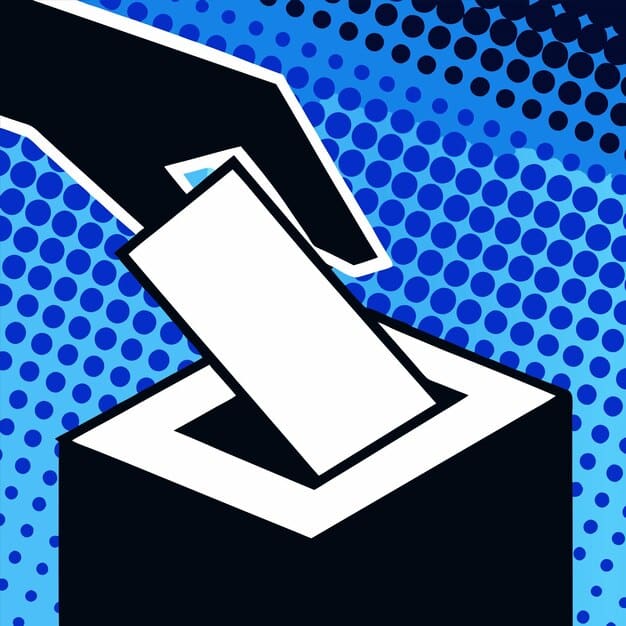Blockchain & Government: Transforming US Public Services

Blockchain technology offers innovative solutions for enhancing transparency, security, and efficiency in US public services, from voting systems to supply chain management.
The intersection of Blockchain and Government: Exploring Use Cases for Public Services in the US is rapidly evolving, offering unprecedented opportunities to revolutionize how public services are delivered. This article delves into these possibilities, highlighting practical applications and their potential impact.
Understanding Blockchain Technology for Government
Blockchain technology is more than just cryptocurrency; it’s a revolutionary framework that can reshape various aspects of governance. Its decentralized, transparent, and secure nature makes it particularly well-suited for addressing many challenges faced by public services. By understanding the core mechanics of blockchain, we can better appreciate its potential to transform government operations.
What is Blockchain?
At its core, a blockchain is a distributed, immutable ledger that records transactions in a secure and transparent manner. Each block in the chain contains a set of transactions, and once a block is added to the chain, it cannot be altered. This feature ensures data integrity and builds trust among participants.
Key Benefits for Public Services
The benefits of blockchain in government are numerous. Transparency is enhanced as all transactions are recorded publicly and are easily auditable. Security is improved due to the cryptographic protection of the data. Efficiency is increased through automation and the elimination of intermediaries. These advantages contribute to more accountable and effective governance.
- Enhanced Transparency: All transactions are publicly recorded and easily auditable.
- Improved Security: Cryptographic protection ensures data integrity.
- Increased Efficiency: Automation streamlines processes and reduces intermediaries.
- Greater Accountability: Immutable records hold individuals and institutions accountable.
Blockchain’s transparent nature can significantly curb corruption and fraud. By allowing citizens to track how public funds are being spent, it promotes greater accountability. The technology also reduces bureaucratic red tape, enabling faster and more streamlined service delivery.

Securing Digital Identity and Credentials
One of the most promising applications of blockchain in government is the management of digital identities and credentials. Traditional systems often rely on centralized databases, which are vulnerable to breaches and fraud. Blockchain offers a more secure and verifiable solution. Using blockchain for digital identity can transform how governments handle citizen data, making it more secure and efficient.
Self-Sovereign Identity (SSI)
Self-Sovereign Identity (SSI) allows individuals to control their own digital identities without relying on central authorities. With SSI, citizens can securely store their credentials on a blockchain and selectively share them with government agencies, ensuring privacy and reducing the risk of identity theft.
Use Cases in Credential Management
Blockchain can be used to issue and verify various types of credentials, such as educational degrees, professional licenses, and birth certificates. This not only streamlines the verification process but also makes it more secure, as the credentials cannot be easily forged or tampered with. This has implications for various sectors from education to healthcare.
- Secure Storage: Credentials are stored securely on the blockchain.
- Efficient Verification: Streamlines and secures the verification process.
- Reduced Fraud: Minimizes risks associated with identity theft and fraud.
- User Control: Empowers individuals to manage their own digital identities.
Many states are exploring blockchain-based solutions for issuing and verifying digital credentials. This not only simplifies administrative processes but also empowers citizens with greater control over their personal data. Ensuring data privacy and security is paramount in these applications.
Improving Voting Systems with Blockchain
The integrity of voting systems is a cornerstone of democracy. Blockchain technology offers a potential solution to enhance the security and transparency of elections. By using blockchain for voting, governments can reduce voter fraud and increase public confidence in the electoral process. The immutable nature of blockchain ensures that votes cannot be altered or deleted, providing a secure and verifiable record.
How Blockchain Can Secure Elections
Blockchain can secure elections by creating a digital, tamper-proof record of each vote. Voters can verify that their votes were accurately recorded without compromising their anonymity. The transparency of the blockchain allows election officials and the public to audit the results, reducing the potential for fraud.
Challenges and Considerations
Implementing blockchain in voting systems is not without challenges. Scalability, usability, and security are key concerns that need to be addressed. It is important to ensure that the system is accessible to all voters, regardless of their technical skills. Robust security measures must be in place to prevent hacking and manipulation.

- Increased Security: Tamper-proof records reduce the risk of fraud.
- Enhanced Transparency: Public auditability builds trust in the electoral process.
- Improved Accuracy: Accurate recording of votes ensures fair elections.
- Reduced Costs: Streamlined processes can lead to cost savings.
Pilot projects are underway in several states to test the feasibility of blockchain-based voting systems. While these initiatives are promising, they also highlight the need for careful planning and implementation to ensure that the system is secure, accessible, and reliable.
Supply Chain Management and Government Procurement
Government procurement processes often involve complex supply chains, which can be prone to inefficiencies and fraud. Blockchain technology can improve supply chain management by providing a transparent and immutable record of all transactions. This can lead to greater accountability, reduced costs, and more efficient operations. The complexities of government procurement make it a prime candidate for blockchain solutions.
Tracking Goods and Services
With blockchain, governments can track goods and services from their origin to their final destination. This ensures that products are authentic and that suppliers are adhering to ethical and environmental standards. The transparency of the blockchain reduces the risk of counterfeit goods entering the supply chain.
Enhancing Transparency in Procurement
Blockchain can make the procurement process more transparent by recording all bids, contracts, and payments on a public ledger. This reduces the potential for corruption and favoritism, promoting fair competition among suppliers. The use of smart contracts can automate many aspects of the procurement process, further enhancing efficiency.
- Improved Tracking: Transparency in the origin and destination of goods and services.
- Reduced Fraud: Ensures the authenticity of products and services.
- Increased Efficiency: Automation streamlines processes and reduces red tape.
- Greater Accountability: Transparent records hold suppliers accountable.
Several government agencies are exploring blockchain solutions for supply chain management. These initiatives aim to improve transparency, reduce costs, and ensure that products and services are delivered in a timely and efficient manner. Collaboration between government agencies and private sector companies is crucial for successful implementation.
Land Registry and Property Management
Land registry and property management can be complex and often plagued by fraud and disputes. Blockchain technology offers a solution by creating a secure and transparent record of property ownership. This can streamline transactions, reduce legal disputes, and enhance overall efficiency. The immutability of blockchain ensures that property records cannot be altered or tampered with.
Securing Property Records
Blockchain can secure property records by creating a digital, tamper-proof ledger of ownership. This reduces the risk of fraud and makes it easier to verify property titles. Smart contracts can automate the transfer of property ownership, simplifying the process and reducing the need for intermediaries.
Reducing Disputes and Fraud
By providing a transparent and immutable record of property ownership, blockchain can reduce disputes and fraud. All transactions are recorded publicly, making it easier to track the history of a property and identify any irregularities. This builds trust and confidence in the property market.
- Secure Records: Tamper-proof ledger of property ownership.
- Reduced Fraud: Transparent records minimize the risk of fraud and disputes.
- Streamlined Transactions: Automation simplifies property transfers.
- Increased Efficiency: Reduces the need for intermediaries and paperwork.
Countries around the world are experimenting with blockchain-based land registry systems. These initiatives aim to improve transparency, reduce costs, and make it easier for citizens to buy and sell property. Collaboration between government agencies and technology providers is essential for successful implementation.
Healthcare Records and Management
The healthcare sector faces numerous challenges in managing and securing patient data. Blockchain technology can provide a solution by creating a secure and interoperable system for storing and sharing medical records. This can improve patient care, reduce fraud, and enhance overall efficiency. The sensitivity of healthcare data makes blockchain’s security features particularly valuable.
Secure Storage of Medical Records
Blockchain can securely store medical records by encrypting the data and distributing it across a network. This reduces the risk of data breaches and ensures that patient information is protected. Patients can control who has access to their records, giving them greater autonomy over their healthcare data.
Improving Interoperability
One of the biggest challenges in healthcare is the lack of interoperability between different systems. Blockchain can facilitate the secure exchange of medical records between healthcare providers, improving coordination of care and reducing the risk of errors. This leads to more efficient and effective healthcare delivery.
- Secure Data Storage: Encrypted and distributed records protect patient information.
- Enhanced Interoperability: Facilitates secure data exchange between healthcare providers.
- Patient Control: Empowers patients to manage their healthcare data.
- Reduced Fraud: Minimizes risks associated with fraudulent claims and data breaches.
Various healthcare organizations are exploring blockchain-based solutions for managing patient data. These initiatives aim to improve data security, enhance interoperability, and empower patients with greater control over their healthcare information. Collaboration between healthcare providers, technology companies, and government agencies is crucial for successful implementation.
| Key Point | Brief Description |
|---|---|
| 🗳️ Secure Voting | Blockchain can enhance the security and transparency of elections. |
| 🆔 Digital Identity | Blockchain enables secure, self-sovereign digital identity systems. |
| 📦 Supply Chain | Improves transparency and efficiency in government procurement. |
| 🏥 Healthcare | Secures medical records and enhances data interoperability. |
Frequently Asked Questions
▼
Blockchain is a decentralized, distributed, and immutable digital ledger used to record transactions across many computers, ensuring that any involved record cannot be altered retroactively, without the alteration of all subsequent blocks.
▼
Blockchain enhances transparency by providing a public record of transactions that are easily auditable. Because the ledger is distributed, no single entity controls the data, reducing the risk of corruption and fraud.
▼
Blockchain can make voting more secure and transparent. It creates a tamper-proof record of each vote, reducing the potential for fraud. Voters can also verify their votes without compromising their anonymity.
▼
Blockchain-based digital identity systems allow individuals to control their personal data. They can securely store credentials and selectively share them, enhancing privacy and reducing the risk of identity theft.
▼
Blockchain improves supply chain management by providing a transparent and immutable record of all transactions. This enables tracking of goods and services from origin to destination, ensuring authenticity and compliance with standards.
Conclusion
In conclusion, blockchain technology holds significant potential for transforming US public services. From enhancing transparency and security to improving efficiency and accountability, the applications of blockchain in government are vast and promising. As more pilot projects and initiatives are launched, the benefits of this technology will become increasingly evident.





